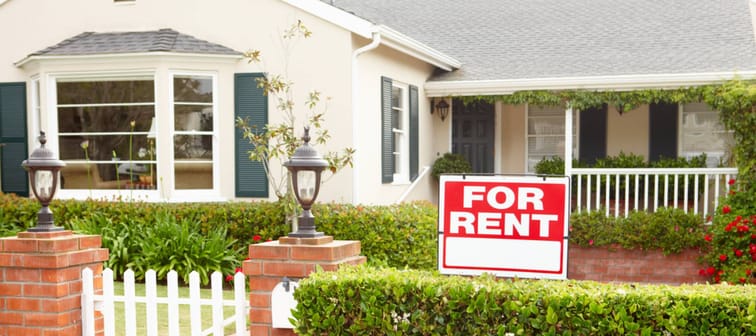Rent-to-own agreements allow prospective homebuyers to rent and live in houses they’d one day like to buy. While you’re renting, you’ll pay a little extra every month that can be used as your down payment once the rental term is up.
This buying model is marketed as a way to transition to homeownership without having to clear the hurdle of affording a down payment.
But if you look closely at this arrangement, you may see some cracks.
How does a rent-to-own home deal work?
With a rent-to-own contract, you can chip away at your down payment over time, rather than having to have it in cash upfront. And your down payment installments help build equity in the home before you’re the official owner.
And if you’ve had financial struggles in the past, you’ll also eke out a little more time to get your finances in good shape, like improving your credit score, so you can qualify for a better rate on your mortgage.
That being said, it’s not as tidy as a traditional sale.
In these deals, everything is up for negotiation: purchase prices, down payments, closing costs. It can get convoluted as you try to come to terms on all aspects of the sale.
And there are no standard contracts for this approach. With completely negotiable terms and fewer regulations compared to straightforward buying or renting, buyers face a lot more risk with this set up.
If it’s something you’re considering, you should seek out qualified professionals like a real estate agent and an attorney to go over the agreement before you sign anything.
How rent-to-own agreements are structured
There are two different types of agreements you might enter into: a lease option agreement or a lease purchase agreement.
The option agreement allows you to decide if you want to go forward with purchasing the home once the rental term has ended. And with a purchase agreement, you’re legally required to go through with the sale.
With so many variables involved, agreements vary widely in structure and content, but they contain the same basic components:
- Purchase price: With lease-to-own agreements, sometimes the price becomes official when you sign the contract, but other times it’s decided only once the lease term expires. And that price can be based on the value of the home when you enter into the deal, or what the seller anticipates the house's value will be down the road.
- Rent payments: The contract will lay out how much you'll pay in rent every month. You may find the home is generally more expensive than other rentals in the area because part of the payment is being credited towards your future purchase of the house.
- Maintenance: While you’re renting, the seller may ask you to be responsible for any regular costs associated with the home, including maintenance and repairs. You may also have to cover homeowner’s association (HOA) fees and property taxes. Make sure you clearly read the contract and understand exactly what you’re responsible for while you’re still renting.
- Option money: This mandatory one-time, non-refundable fee is what grants you the opportunity to buy the house. Some sellers will agree to put this sum towards your equity in the home, but it’s up to them. How much you’ll pay is generally based on a set percentage of the value of the home.
- Lease term: The lease term, or how long you’ll rent the home, will be written into your contract. If this term ends and you can't qualify for financing or decide you don’t want to buy the home afterall, the option to buy will expire.
- Closing process: Once the lease term ends, if you plan to purchase the property, you’ll need to secure financing. After you’ve been approved, your mortgage lender will set the closing date and after that, the ownership will then be transferred over to you. Whatever was set aside for your purchase will then be credited to your loan.
Downsides of a rent-to-own deal
While it may all sound great, and you’ve got the insurance of a contract, it doesn’t take much for a rent-to-own situation to go sideways.
If you’re already in a precarious financial position, a lease-to-own agreement isn’t likely to make it better. First off, your rent will likely be significantly more expensive than if you were in a simple rental agreement.
Keep in mind that your landlord or property owner isn’t required to put your option money towards the down payment. Which means they can decide to keep it for themselves, leaving you out a chunk of change.
And if you need to move or decide not to buy the home after the rental term ends, you’ll be walking away with less than nothing — as you’ll lose all the money you already invested in the home’s equity.
These contracts also tend to favor the seller. At any point, the seller can cancel the contract for any small infraction or violation and you have no recourse. Or they could simply change their mind. Going to court to force them to follow through on the deal can be expensive and there’s no guarantee it will work anyway.
Even if everything goes well, you may also find yourself on the hook for any repairs and maintenance that come up while still renting. And since you’re not yet an owner in the home, you wouldn’t qualify for a home equity loan or line of credit to help you cover the costs.
There’s also the possibility that the home’s value could decrease. If you agree to a set price when you sign the contract and the home isn’t worth it by the time you’re prepared to buy, it may be hard to find a mortgage lender willing to loan you more than the house is worth.
Finally, if anything happens with the actual owner’s financial situation and there is a lien placed on the home or it goes into foreclosure, you’ll lose your rights to the property.
Alternatives to a rent-to-own home
Given all the risk on the buyer’s end, rent-to-own may not be the right approach for most aspiring home buyers.
If your biggest challenge is saving up for a down payment, know that there are already government programs designed to make buying a home more affordable for those who struggle with that aspect of achieving homeownership.
When you think about it, why wouldn’t you just put aside the extra money you’d pay to save up for a down payment instead? And with it in your own bank account, you’d get to decide for yourself how to invest it.
If your finances need straightening out, the best option for you would be to stay in a rental you can afford and continue to chip away at your debts. When you’re back in the black, then you can put aside the funds you’ll need to buy a home.
You may find, with a little time and focus, that you’re closer to fulfilling your dream than you’d originally thought.
A better way to buy property?
Of course, buying a home isn't the only way to invest in real estate.
Amid persistent inflation and an uncertain economy, real estate moguls are still finding ways to effectively invest their millions.
Prime commercial real estate, for example, has outperformed the S&P 500 over a 25-year period. With the help of new platforms, these kinds of opportunities are now available to retail investors. Not just the ultra rich.
With a single investment, investors can own institutional-quality properties leased by brands like CVS, Kroger and Walmart — and collect stable grocery store-anchored income on a quarterly basis.



-1692125006-1695153507.jpg)

